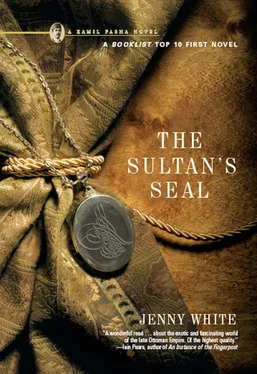Jenny White - The Sultan's seal
Здесь есть возможность читать онлайн «Jenny White - The Sultan's seal» весь текст электронной книги совершенно бесплатно (целиком полную версию без сокращений). В некоторых случаях можно слушать аудио, скачать через торрент в формате fb2 и присутствует краткое содержание. Жанр: Исторический детектив, на английском языке. Описание произведения, (предисловие) а так же отзывы посетителей доступны на портале библиотеки ЛибКат.
- Название:The Sultan's seal
- Автор:
- Жанр:
- Год:неизвестен
- ISBN:нет данных
- Рейтинг книги:5 / 5. Голосов: 1
-
Избранное:Добавить в избранное
- Отзывы:
-
Ваша оценка:
- 100
- 1
- 2
- 3
- 4
- 5
The Sultan's seal: краткое содержание, описание и аннотация
Предлагаем к чтению аннотацию, описание, краткое содержание или предисловие (зависит от того, что написал сам автор книги «The Sultan's seal»). Если вы не нашли необходимую информацию о книге — напишите в комментариях, мы постараемся отыскать её.
The Sultan's seal — читать онлайн бесплатно полную книгу (весь текст) целиком
Ниже представлен текст книги, разбитый по страницам. Система сохранения места последней прочитанной страницы, позволяет с удобством читать онлайн бесплатно книгу «The Sultan's seal», без необходимости каждый раз заново искать на чём Вы остановились. Поставьте закладку, и сможете в любой момент перейти на страницу, на которой закончили чтение.
Интервал:
Закладка:
Kamil doesn’t smile.
They sit silently for a few moments, each lost in thought.
“Poor Hannah,” Sybil says finally. “Mother wrote a letter to Hannah’s parents in Bournemouth, explaining as delicately as she could what had happened to their daughter, but never received an answer. We buried her in the English cemetery in Haidar Pasha.”
“It is terribly sad,” he says awkwardly. “So you know nothing about Hannah Hanoum’s family?”
“We were able to learn nothing at all. Except for a few people’s memory of her, it’s as if she never existed.” Sybil turns her face away.
Kamil dismisses an impulse to take Sybil’s hand and comfort her.
“She must have family somewhere that remembers her,” he reassures her. “And she did have a memorable life, at least while she was among us. After all, it’s not every day that a young Englishwoman comes to Istanbul to work for the royal family. Surely there were good things in her life that made it worth living. That served her better than someone’s memory of her after she was gone.”
“I suppose you’re right. I wonder what happened to her belongings. I remember they were sent here to the embassy. I doubt Father would know. He doesn’t concern himself with that sort of thing. Mother would have dealt with it. There’s a room off the kitchen where she stored odd things. Why don’t we look there?” Sybil straightens in her chair and gives him a small smile, cheered by the prospect of a common task.
The kitchen maid stands by the door, mouth open, as Kamil and Sybil pull out endless jars of preserved peaches and jams that had been stacked at the front of the shelves in the storage room, obscuring a variety of neatly arranged objects: an old marble mantel clock surmounted by a gold eagle; three dented copper bowls with worn tinning; a box of silver spoons; and, at the back of the lowest shelf, a suitcase tied shut with string. Attached to the handle is a neat label addressed in a spidery hand: “Hannah Simmons, d. 1878. Belongings. Unable to forward.”
Kamil carries the suitcase to the kitchen table. Sybil gestures for the maid to leave.
“Let’s see what’s in it.” Sybil pulls the case toward her and begins to worry the string. Kamil takes a short, horn-handled knife from his jacket pocket. He slices the string, opens the suitcase, and gently lifts its contents onto the table: two plain dresses, a pair of lace-up shoes, a chased-silver brush set, a pair of embroidered Turkish slippers, and some documents.
“The remnants of a life,” Sybil muses sadly. “So little.”
Kamil runs his fingers around the edge of the suitcase’s lining. He finds an opening and tugs at it, revealing a small velvet box inside a hollow space behind the lock. Kamil pulls the box out and lays it on the table. He stands abruptly and goes to a large clay jar in the corner of the room, removes the lid, and dips in the tinned copper cup attached by a chain. When he has drunk his fill, he replaces the lid and returns to the table.
Kamil pries the latch back with his thumbnail and swings the lid open. Inside is a padded nest of blue silk, a round indentation in its center. Kamil reaches into his pocket and brings out the pendant found around Mary Dixon’s neck. He settles it gently into the impression. It is a perfect fit, as he knew it would be.
14
At the entrance to the grand vizier’s villa waits a eunuch. He is wearing a spotless white robe that makes a startling contrast to his blue-black skin. His face is smooth and rounded as an aubergine, but his limbs seem stretched, longer than one might expect for his size. Into the broad sash that binds his substantial middle is tucked a flywhisk at a rakish angle, like an ornament or egret feathers on a turban. As Sybil climbs from the carriage, he bows deeply, sweeping his hand against his mouth, then his forehead, in a grand gesture of obeisance. There is a haughtiness about him too. His eyes always rest on a spot above Sybil’s head. He takes no notice of the British regimental lieutenant in scarlet coat saluting Sybil with a white-gloved hand, then leading the remainder of her armed escort toward the guardhouse. The eunuch never speaks. When he guides Sybil through the massive marble doors, the palms of his hand flash yellow, like fish turning.
Sybil trails the eunuch through rooms of rich furnishings and enormous fine carpets. Oil paintings and framed Quranic inscriptions are hung high up near the ceiling. She can see her reflection in the mirrored walls-a white wraith gliding behind a black eunuch, two ghosts in the halls of empire.
At a door carved with gilded swags of roses, the eunuch gives her yellow slippers embroidered with flowers made of tiny colorful crystals. But the women who receive her beyond the door are dressed in European fashion, Oriental only in the surfeit of gold and silver thread and embroidery covering every surface. They are encased from top to bottom in jewels, like Fabergé eggs. They sit stiffly in upholstered armchairs, held upright by their corsets. Some have silk scarves draped rakishly over their hair, pinned by diamond brooches.
What, oh, what have we wrought, Sybil thinks dejectedly, if this is what the world has learned from us?
Asma Sultan rises and walks toward Sybil, hands spread in greeting. Her face is round and pleasant, with a button nose and small eyes. An undistinguished face, the kind one sees but doesn’t remember seeing, sipping afternoon tea in a hotel lobby or handing tuppence to a grandchild. Delicate white skin hangs loose along her cheeks and below her chin. The eyes that look her guest over, however, are sharp as flint.
“My family is honored by your presence at my grandson’s circumcision.”
“I’m happy to be here, Your Highness.” Sybil can’t remember whether she should bow or curtsy, does both, and stumbles in the unaccustomed slippers.
Large windows frame the blue expanse of the Bosphorus. A French door stands open. The scent of jasmine drifts in from the terrace. The room is flooded with light.
“May I introduce Sybil Hanoum, daughter of our illustrious English ambassador,” the hostess announces in slightly accented French.
The women smile and greet her in their high-pitched voices. Sybil responds in Turkish, causing murmurs of approval. She moves around the room, stopping before each woman and waiting while the hostess introduces the guest and mentions, in flowery Turkish praise, the positions of each woman’s husband or father. The women are introduced in order of their prestige.
“Your coming is welcome.”
“I am happy to find myself here.”
“How are you?”
“Fine, thank you. And you, how are you?”
“I am fine, thanks be to Allah.”
“How are your father and mother? Your family?”
“They are well. And your father, is he well?”
Of course, the hostess will have told the women all she knew about Sybil before her arrival. They would not ask about a mother who was dead, or a child, when Sybil is unmarried at what most would consider the advanced age of twenty-three. Clearly, after the death of her mother, Sybil has devoted her life to caring for her father, forgoing a family herself. A good, dutiful daughter.
All the chairs are pushed against the walls, as if the women are still reclining on a long divan. This makes conversation impossible with anyone other than Sybil’s immediate neighbors, so she has trouble following the conversations. One of the women switches to French, but Sybil’s French is poor, so they return to Turkish.
The seven-year-old boy who will shortly be lifted into manhood at the point of a knife is dressed in yellow and blue silken robes and struts about among the women like a peacock, trailed by his governess.
Читать дальшеИнтервал:
Закладка:
Похожие книги на «The Sultan's seal»
Представляем Вашему вниманию похожие книги на «The Sultan's seal» списком для выбора. Мы отобрали схожую по названию и смыслу литературу в надежде предоставить читателям больше вариантов отыскать новые, интересные, ещё непрочитанные произведения.
Обсуждение, отзывы о книге «The Sultan's seal» и просто собственные мнения читателей. Оставьте ваши комментарии, напишите, что Вы думаете о произведении, его смысле или главных героях. Укажите что конкретно понравилось, а что нет, и почему Вы так считаете.












